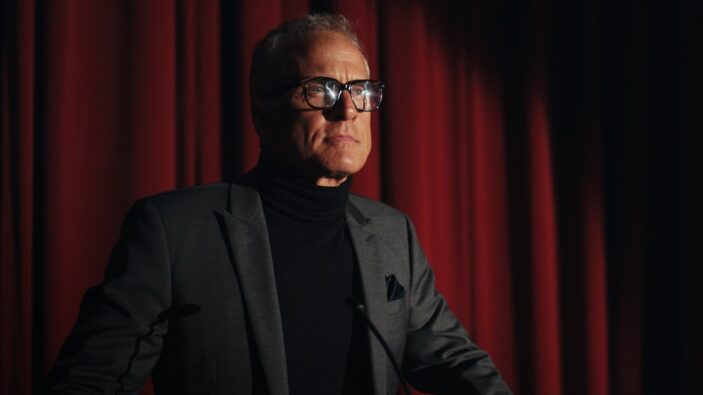
The type of dialogue-driven feature that would make screenwriter Aaron Sorkin beam with pride, The Way We Speak is a talky, compelling drama that speaks to the power of one’s conviction in their beliefs and, more importantly, respecting another’s differing opinion.
Written and directed by Ian Ebright, the film centres itself around Simon Harrington (Patrick Fabian, dominatingly superb), an essayist set to debate his good friend George Rossi (Ricco DiStefano). With the support of his cancer-stricken wife, Claire (Diana Coconubo), herself a prominent physician, Simon and George’s debate is set over the course of a few days, with extended notoriety and prized cash as their reward.
Tragically, only days before the debate, George passes away. Wanting to honour his legacy – and hone the spotlight (the narcissism is real) – Simon insists the debate continue, and so author Sarah Clawson (Kailey Rhodes) is brought in as a replacement. The topic on hand: The existence (and absence) of God.
Despite the topic centring around religion, Ebright wisely doesn’t choose sides in the debate between Simon and Sarah. There’s no personal agenda or belief seemingly pushed on the viewer, with The Way We Speak ultimately more about the type of discourse than can so easily divide a population. The debate itself is fascinating, but it too becomes more about Simon’s own God complex; ironic when he’s debating against God’s existence.
As someone who has lived in the shadows of his wife’s achievements, there’s the sense that Simon partly enjoys the fact that her diagnosis allows him to both step out to showcase his intellect and to play the role of the devoted, concerned husband. Ironically, in earning his own spotlight, his vain behaviour shines brightest, with his intent on winning the debate proving more important than participating in a genuine conversation; his speech notes ultimately turning into personal attacks on Sarah’s belief and character.
Whilst religion as a subject can be difficult to navigate, Ebright manages to never alienate. The film is undeniably fascinating in how it paints both sides of the argument, and whether you agree with one side or the other, or even neither, The Way We Speak refuses to lose its hold on its audience’s fascination. And a large reason as to why this story is as enticing as it is boils down to Fabian’s performance.
Coconubo and Rhodes soften many of the edges that Fabian cuts through. His Simon is unappealing in his self-service, but it’s a testament to both Fabian as an actor and Ebright as a director that they make someone we shouldn’t want to devote time to an endlessly fascinating design. He exemplifies the egotistical notion that being seen on the most literal, surface level is equivalent to being heard, but it’s the words of those around him that hold the most weight.
A movie with a message that, ironically, doesn’t lecture the audience in the process, The Way We Speak places importance over the way something is said more than the content itself. Disagreement between parties is natural, and Ebright’s writing stresses the organic complexity of such, doing so in a way that proves one’s ego should ultimately always be removed.
![]()
![]()
![]()
![]()
![]()
FOUR STARS (OUT OF FIVE)
The Way We Speak is available now on Digital and on Demand platforms in the United States and Canada. An Australian release is yet to be determined.
